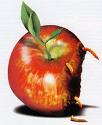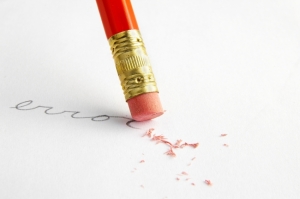 Gustave Flaubert kept rotten apples in his desk drawer to evoke autumn when writing scenes that took place in that season.
Gustave Flaubert kept rotten apples in his desk drawer to evoke autumn when writing scenes that took place in that season.
Writing Tip #4: Advice from Kurt Vonnegut
 “Make [your] characters want something right away—even if it’s only a glass of water. Characters paralyzed by the meaninglessness of modern life still have to drink water from time to time.”
“Make [your] characters want something right away—even if it’s only a glass of water. Characters paralyzed by the meaninglessness of modern life still have to drink water from time to time.”
Writer vs. Editor
I used to agonize over each word and phrase in a first draft, doubtful that when I came back to it, weeks or months later, I would be able to see, much less fix, the things that didn’t work. But while I was writing my third novel, The Way Life Should Be – and editing other people’s manuscripts at the same time – I had an epiphany.
(Yes, it took three novels to figure this out.)
Here’s what I realized: My editor-self is surprisingly clear-headed, even ruthless. Hyper-critical and exacting, she is capable of transforming a freewheeling, messy draft into clear and lucid prose. And she likes doing it. 
This realization freed my writer-self to have more fun. My first drafts have become more spontaneous and energetic; I feel free to try out a range of ideas, follow tangents in odd directions, write a scene of dialogue three different ways – all with the knowledge that my editor-self will step in when needed. With a red pencil and a roll of the eyes: What was she thinking?
Writing Tip #3: Use a Monkey Wrench

When I’m developing a new character I often throw a monkey wrench into the works to create internal tension. I give this person a trait (an obsession, a habit, a fixation, a physical peculiarity or mannerism) that seems to cut against the grain of his or her personality. I find that these contradictions usually add depth and dimension, and stimulate me to think about my character in new ways.
It’s the Writing, Stupid – Part 2
The words on the page are the only things that count. (See “It’s the Writing, Stupid,” below.)
That’s all well and good. But novelist Debra Galant poses an interesting question: what about those non-writing writing days? Does it count, for example, if you’re sketching notes about a character, doing historical research at the library or online, or creating an outline for the story? Does it count if you’re mulling things over while washing the breakfast dishes (what if the secret the brother is hiding from the family involves the mysterious neighbor; what if it turns out, in fact, that he is intimately involved in the mystery…) or taking a brisk walk?
Deb says, “I always keep a process journal for whatever novel I’m working on. Today I did a tarot reading for my character Hugo. Took notes, thought about him, mused a bit, saw the need for new character to be developed. But no pages added to the manuscript. I’m at very early stages. What do you think? Does note-taking count as writing?”
Well — since you asked! — here’s what I think. For me, note-taking does not count. It’s a necessary part of the process, of course – like research and planning and ruminating in the shower. All of it is part of creating a novel. But it’s not writing.
In order to get those words on the page, I have to remind myself that I can fill notebooks with musings about my characters’ motivations; I can research the history of the orphan trains until the proverbial cows come home; I can plan and strategize and plot. But none of it actually means anything until it becomes part of the story.

